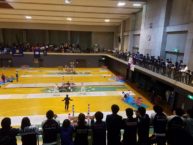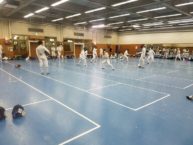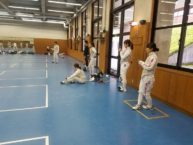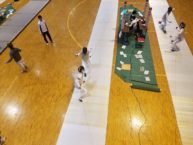Ever since middle school, the sport of fencing has been an important part of my life, so naturally I picked fencing as my CIP. The Doshisha fencing team practices every day but Monday for about 2 hours. I’ve only been going to Tuesday and Thursday practices because I have to take a 70 minute bus ride to get to Doshisha’s Kyotanabe campus for practice. Much like in America, practice is composed of some warm-up, followed by free bouting.
Practicing with the fencing club was a great opportunity to learn about Japanese society. For example, like most sports club in Japan, younger members are expected to use formal language when talking to older members. Moreover, members usually only socialize with other people in the same age group. I’ll never forget my first night of practice when I asked a freshman if he wanted to sit together on the bus ride home. He was bewildered that I even considered asking him instead of another Junior (even though I hadn’t talked to the other Juniors yet!).
That said, the most important thing I’ve learned from the fencing club is that no matter how different two cultures are, some things are the same around the world. Sore legs after practice, triumphant screams after a successful touch – these sorts of experiences and emotions are shared between fencers in Japan, America, and around the world. In short the love and dedication we share does not just belong to one culture. It is universal.
Thus, my advice to the students that follow in my footsteps at KCJS is to remember that no matter how strange and alien Japan might seem at times, remember that you certainly have some common ground with the people and culture around you. Explore those similarities and differences by getting involved. Immerse yourself. Even if you don’t know what to say, even if you aren’t confident in your Japanese – dive in head first. I know it might be scary, but I promise that no matter how scary it is, it will be even more rewarding.





This sounds like such a rewarding CIP! I felt the same way about the ballet portion of my CIP- even though ballet/fencing aren’t “Japanese” activities, it’s such an amazing feeling to realize that the same community that’s important to you in the US also exists abroad!
Also, that’s hilarious about your first-year friend on your first day!! It can be such a weird dynamic to not quite know where you fit in in terms of senpai/kohai relationships- in some ways, being a gaijin feels like being the ultimate kohai, but then a lot of groups still end up treating us like we’re our actual age. This was something that was weird in my CIP at times as well- but good for you for getting involved and learning more about how the social rules work! It sounds like your CIP has been a great experience!
“The ultimate kouahi” is a really good way of putting it. There’s definitely a certain level of feeling like you’re outside of the group at first because everyone else sort of knows exactly how to interact with everyone else but you’re not sure what you’re supposed to do. And on top of that feeling like if you mess up you’ll offend someone. I ended up learning by just imitating everyone I knew was my age. (I’m guessing it might have been similar for you!)
Experiencing the fencing club’s senpai-kouhai hierarchy sounds pretty interesting – I wonder if its typical across the board for sports. Do you have any thoughts about the pros and cons of this kind of structure?
I think overall I’m not really a fan of the system. This is probably my American perspective speaking, but I really don’t feel like age has that much to do with anything. Commitment to group, skill, personality – all of these things exist independent of age, so not having to deal with artificial barriers in speech and communication seems like the best way to establish a tightly knit group.
That said, I think that having a sort of “system” defining how the group is supposed to operate helps make many things go much more smoothly.
Hi again Michael! I forgot to ask- were there any aspects of Fencing in Japan that stood out to you as very different from Fencing in the US? And if so, did you have to do anything special to adjust?
Surprisingly everyone’s fencing style, equipment, and such were almost exactly the same as in the US. Practices were also structured almost identically (which in and of itself was a big surprise). One major difference is that in America most matches are refereed in English, while in Japan they ref in French (which is technically what you’re supposed to do).